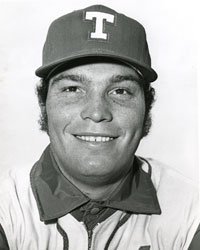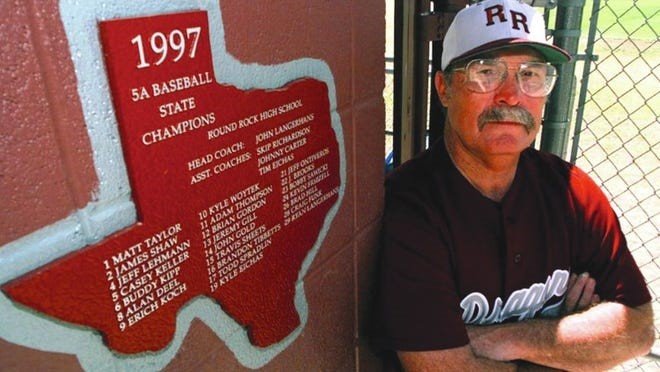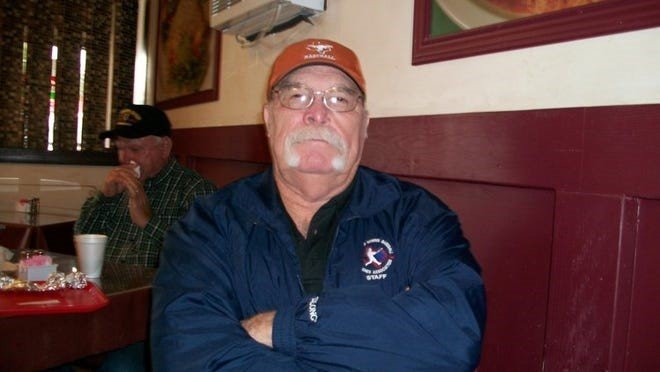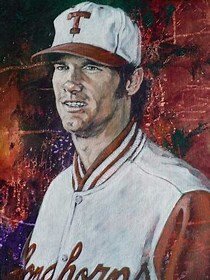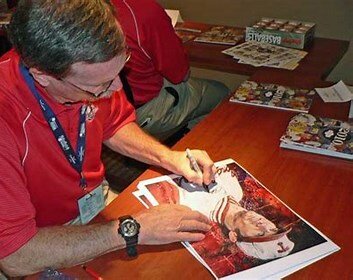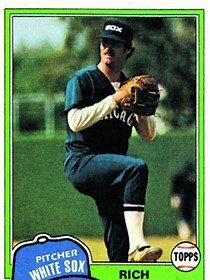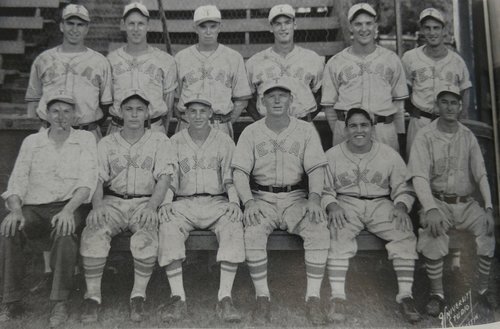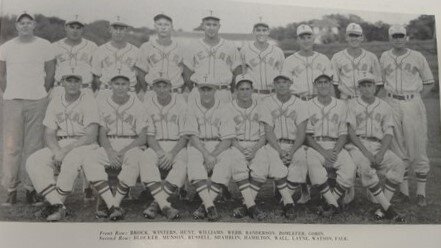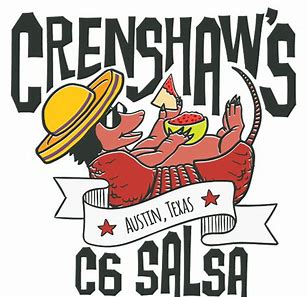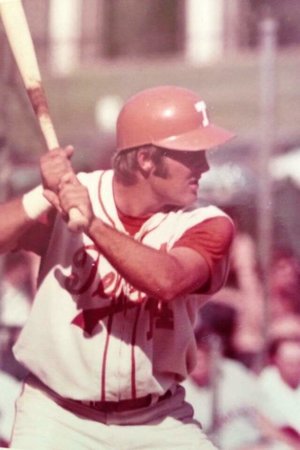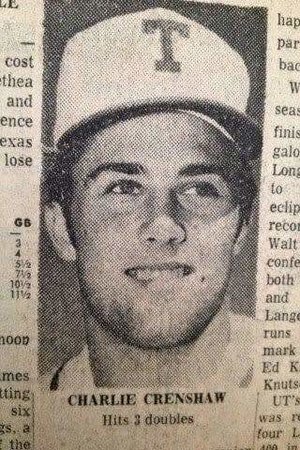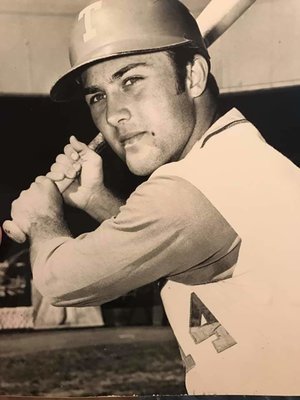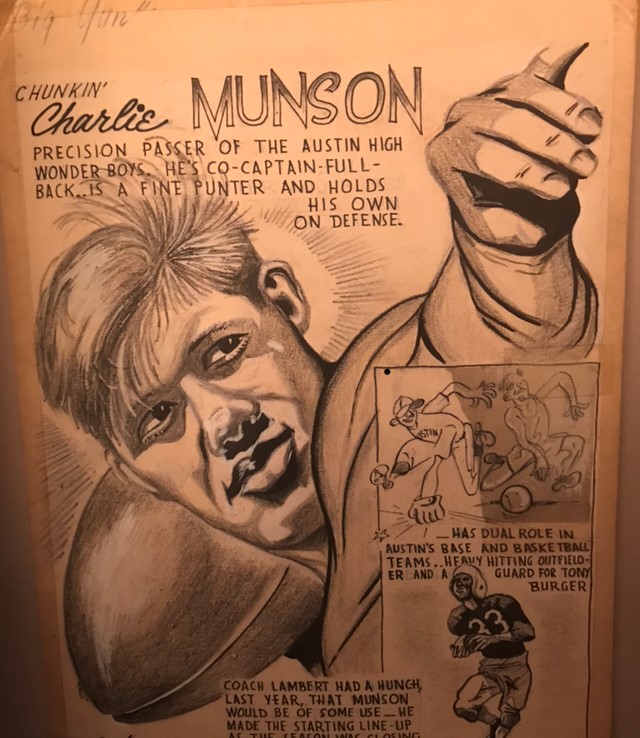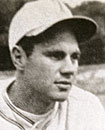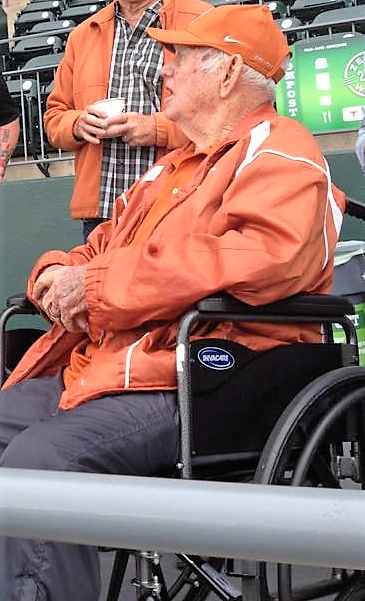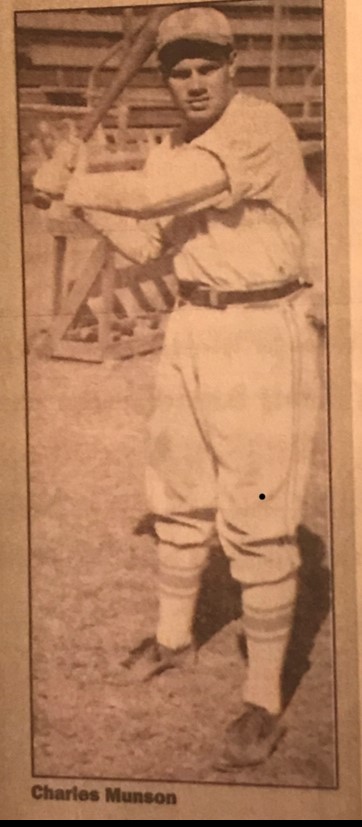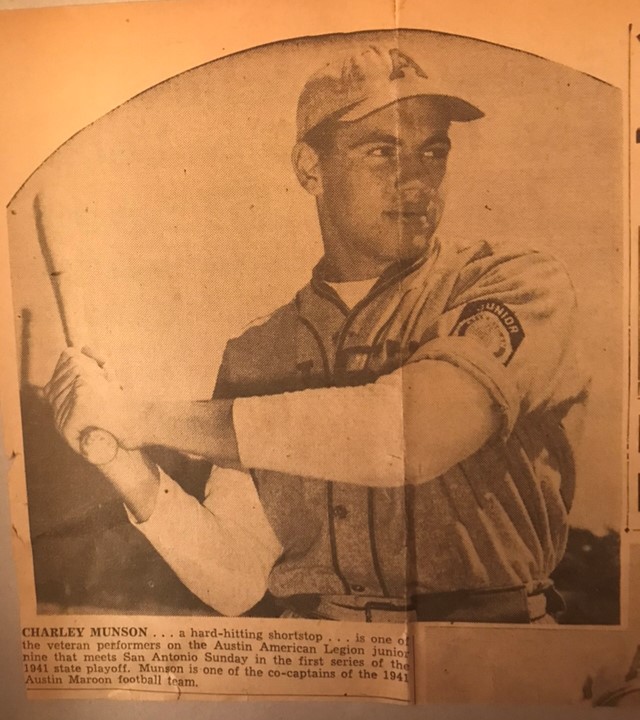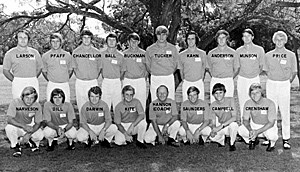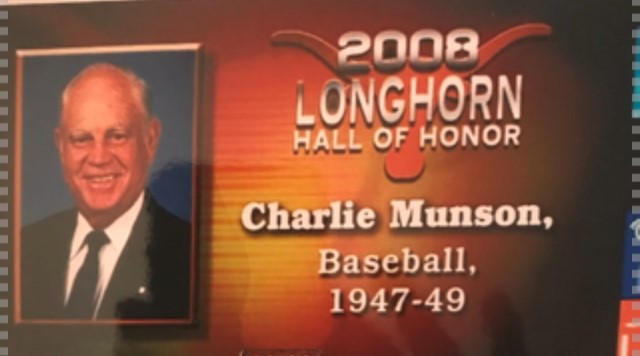Langerhans reflects on a lifetime of coaching
Dragon mentor led RRHS to state title in 1997
Brad Stutzman Austin American Statesman
0:38
2:29
More than half-a-century after the fact, it’s still the look in his father’s eyes that John Langerhans remembers. It was a look that led Langerhans to a lifetime of playing and coaching baseball, including 19 years at Round Rock High School and a state championship along the way.
Watching his dad coach — first in Marble Falls and later in San Antonio — Langerhans knew he would follow in the footsteps of the man for whom he was named.
“He’s the reason I became a coach,” Langerhans said, easing into a fall morning among the breakfast crowd at Tio Dan’s on Round Rock Avenue. “I got to hang out with him and follow him around. I just saw the look in my dad’s eyes, when I was 5-, 6-, 7-years old. Seeing the enjoyment in his eyes, just working with kids, making them better. I told him at 5-, 6-, 7-years old, that’s what I wanted to do.”
And so he did. Wearing a blue Texas High School Baseball Association windbreaker and an orange UT baseball cap, Langerhans’ chosen wardrobe on this particular day reflects the biggest chunk of his life and arguably its best years.
This is a big state, but a small world, and an even smaller circle in the mentor-and-apprentice lives of athletes and their coaches. For when young John Langerhans started playing high school baseball at South San Antonio, the man filling out the Bobcats’ lineup card was none other than Cliff Gustafson, who would go on to coach the Texas Longhorns from 1968-96.
“I’m one of the few guys that had the privilege of playing for coach Gus in high school and college,” Langerhans said. “I played for him (at South San Antonio) in ’67 and joined him at Texas in ’68.”
Langerhans doesn’t mention it — he’s not one to thump his own chest — but as reported in a 2007 Round Rock Leader profile, he pitched a no-hitter in South San’s 1967 3A title game victory over Dumas.
At Clark Field (the forerunner to Disch-Falk), Langerhans and Gustafson teamed up for success again.
According to TexasSports.com: “As a first baseman … Langerhans led the Longhorns to three College World Series appearances and four Southwest Conference titles … He and Jeff Ontiveros (a 1997 RRHS graduate) are the only two players in school history to lead the team in home runs for three or more seasons.”
Langerhans graduated from UT with a degree in coaching, but continued his playing career when the Cleveland Indians drafted the second-team All-America selection.
He rose as high as Double-A ball, playing for the San Antonio Brewers, but after four years injuries cut short his playing career.
Fearing it was too late in the year to land a high school coaching job, Langerhans considered returning to his old off-season occupation – in the Texas State Capitol’s mailroom.
But then — as fate and fortune would have it — a few choice words from UT Assistant Athletic Director Bill Ellington changed his mind.
“He said: ‘John, what in the hell did you get your degree in coaching for? To work in the mail room?”
Langerhans began his coaching career at Lamar Consolidated High School (in the Houston area). He then coached at San Antonio Madison and Uvalde, before landing in Round Rock in 1984. In addition to coaching baseball, Langerhans also taught history. As did his wife, Sharon, whom he met while both were enrolled at UT.
Included in his 613-200 coaching record, over a 28-year career (the final 19 in Round Rock) is the 1997 season when the Dragons won the Class 5A state championship. It was a special year for Langerhans and his team, one capped with a 7-1 win over the defending state champs from Lubbock Monterey.
The coach’s son, Ryan – a pitcher and centerfielder – went the distance on the mound against Monterey and got the win.
“That’s the only father-son that ever pitched a state championship game in Texas history,” said Butch Hart, whose own sons, Jason (1987-90) and Joey (1993-96), played for Langerhans.
Former Leader sports editor Clay Coppedge covered that game, from the unique perspective of one who had written about the Dragons and also played at Monterey for coach Bobby Moegle. He remembers Langerhans fondly.
“He knew baseball like few people I have ever known, and he was a stickler for details,” Coppedge said. “Honest. Well-meaning. He was a hell of a nice guy to me and he definitely had his softer side, especially in regards to his kids.”
Through his career, Langerhans coached a long list of talented players.
John Carter – who in 2004 succeeded Langerhans as Round Rock’s skipper – is on the long list of those who played under him.
Carter also coached for Langerhans. He had this to say, just before Langerhans’ 2007 induction into the Texas High School Baseball Coaches Hall of Fame: “I consider him a mentor to me. He emphasizes the fundamentals. A lot of people don’t concentrate as much on the fundamentals. They think they can do it on pure athleticism and talent. Coach took the everyday kid that doesn’t go off to play at Division I-type schools and made the players the best they can be, to make the team the best it can be.”
Carter’s description of Langerhans doesn’t sound too far different from Langerhans’ description of his own father. Although the elder Langerhans died in 1980, for several seasons he did get to see his son follow in high school-coaching footsteps.
“He’d sit in a lawn chair, right next to the dugout,” Langerhans recalled. “He’d sit right next to the kids walking up to the on-deck circle. He was always talking to them. I wanted to say, ‘Dad, don’t distract them.’ But I also knew he was giving them good advice. And he also had a knack for talking to the kids that didn’t have a lot of self-confidence.”
These days, Langerhans – who was inducted into the Longhorn Hall of Honor in 2011 – relishes the time he and his wife of 42 years can spend with family. Between son Ryan and daughter Kelly (a former assistant volleyball and soccer coach at Pflugerville Hendrickson), they’re grandparents four times over.
Yet to those who know him, it’s no surprise Langerhans has kept a hand in the game. He coaches for the Austin Wings select-baseball program, but his pride and joy is found in the camps he runs with former players such as Brian Gordon, Jordan Danks and, of course, his own son.
They’ve sponsored baseball camps the past three years in Franklin, a small town near Rockdale, with enrollment growing from 60 to 120 to 240 during that time.
“They have one heck of a complex they’ve built,” Langerhans said. “Next year, about when high school baseball season cranks up, will be season four. Here, everybody and his dog puts on a camp. Out there, the kids are hungry for attention.”
As he says this, Langerhans gets that look in his eyes. It’s the same look he remembers seeing in his father’s eyes, more than half-a-century ago.
And he remembers words his father spoke, describing the life of a coach: “He said there’s no money in it. You have to work hard for very little pay. But what you get out of it is the thrill of seeing your kids grow up and become successful people in society. That’s the reward in it – it’s not the money.
“If I had to do it all over again … that’s all I ever wanted to do, be a coach.”
PULL QUOTE: : “I think all my players saw how I put my heart and soul into it, and they gave me their all.” — John Langerhans
Rich Wortham
On Richard Wortham’s recruiting trip to Texas, Gus wrote on a blackboard in his office the words “Cadillac” and “Ford.”
“I thought, ‘He’s going to give me a Cadillac,’ ” Wortham said. “Gus asked me which one I’d pick. I’m trying to figure out which car I’m going to get. So Gus said, ‘If you come to Texas, it’s a Cadillac program.’ ” Wortham didn’t get a Cadillac, but he got an NCAA-record 50 wins.
Richard Wortham has one of the best pitching records in the history of College baseball. His college baseball records confirm these accolades.
He is the first 50-game winner in NCAA history;
Wortham holds the career record for most innings pitched (456) while compiling 50-7 record;
He recording 12 career shutouts and 481 strikeouts;
In 1975 he was selected to the CWS All-Tournament team;
Wortham makes the All-SWC team in 1973 and All-American in 1976;
He is the catalyst for four SWC titles and one national championship;
Wortham earned enough respect to receive team MVP in 1975; and
In 2010 he was elected to the College Baseball Hall of fame joining pitchers Brooks Kieschnick, Burt Hooten, Greg Swindell, and Kirk Dressedorfer.
“I was drafted out of high school, but my dad made it very clear to me that I wasn’t going to sign,” Wortham said. “Any 18-year-old — he may be physically mature, but it takes some time for the mental game to catch up. Coming out of high school you can get influenced in bad ways. The University of Texas was the best for me, and I wouldn’t do anything different.”
Wortham credited former Texas head baseball coach Cliff Gustafson with helping him get mentally adjusted.
What speaks volumes about the character and resolve of Richard is a serious injury he had to overcome to pitch for Texas. Working on a project in Gregory Gym the elevator broke and he incurred an injury that would have ended the career of most individuals. His injury was so severe that the doctors questioned whether he would ever walk again. He did more than walk again. In 1975 he completed the season with a 14-1 record and he pitched a 4 hitter to win the CWS National Champion for the Horns.
Bobby Layne
Bobby Layne was a competitor. He was obsessed with being the best, from grocery shopping to sports. In less than a year, he was shooting in the 70s playing golf.
Doak Walker, who roomed with Bobby at one point, said that even when he went to the grocery store, he had to be the best shopper. A teammate of Bobby's in Detroit commented that when Lane said block, you blocked, and when he said drink, you drank. Bobby Layne, on December 1st, 1986, died of cardiac arrest. He was only 59 years old.
Flashback
Bobby Lane was the star pitcher for the Texas Longhorns. Coach Falk said he was the best pitcher he ever coached, but he was "crazy as hell." In 1946 Bobby pitched a no-hitter against Texas A&M, but Falk said, "he was liable to have been out playing 18 holes of golf that morning," Coach Falk said. Layne likes to pitch games on his terms, and that was ok with Coach Falk. Bobby never lost a southwest Conference baseball game in 4 years.
Myths, Folklore, truth, or EXAGGERATIONs - who knows -but the stories have survived the test of time.
According to the book, Bibb Falk by William A. Cook during games, Coach Falk would sit on one end of the bench. Rooster Andrews, Bobby Layne's roommate, who was a part-time player usually sat on the bench the whole game. So Bobby Lane asked Rooster Andrews one game to occupy the other end of the bench. Lane gave Rooster some money and told him to buy a six-pack of beer. Rooster did as instructed, and between each inning, Lane would slip behind the bench out of Coach Falk's sight and chug a bottle of beer. At the start of the seventh inning, Bobby gave Rooster some more money to buy some more beer. Bobby Lane pitched a no-hitter that day.
Bobby Layne and Rooster Andrews have a car accident and Bobby hurts himself. Bobby Layne throws a no-hitter against Southwestern. The next week horsing around Bobby Layne sticks his foot through a window that requires stitches. The next day Bobby throws another no-hitter against the Aggies. Bobby was 19 years old.
Bobby's overall record at Texas was 39 wins and seven losses, including 27 consecutive wins in Southwest conference play. In 1946 Bobby Lane pitched two no-hitters and had 84 strikeouts. A Southwest conference record that stood for 39 years. The most compelling story about Bobby Lane is that as a Texas Longhorn pitcher, he was never taken out of a game with his team behind.
Bobby Layne said that if I had been a good hitter, he might have chosen to professionally play baseball instead of football. “For me, pitching was too much work,” Layne said.
George Halas, the owner of the Chicago Bears, drafted Bobby Layne but then decided to trade Bobby him. George said "Bobby, I can't afford to keep three quarterbacks, and I can't make Sid retire. He is Jewish, which means more season tickets." Also, "Johnny Lujack attended Notre Dame that also means more season tickets in Chicago than having a quarterback in Texas."
Another Story about Bobby Layne in the late 1960s is from Barbara Wainscott whose husband, Loyd Wainscott, was a Longhorn All American during his participation in the Houston Oilers training camp in Kerrville, Texas.
Barbara shares one night the guys were all at a bar. Can't remember if Rob Layne (Bobby’s son) was there or not. But Bobby came in and told the rookies sitting at the table to "build him a castle". Layne bought beer all night and they stacked the cans up in layers all around the corner booth like five or six beer can floors high. Bobby took it all in stride but the rookies were hammered. Loyd called me later that night to tell me they were celebrating the first girl they'd seen in Kerrville without a scar on her face and he'd just danced with a girl they called "headlights." Bobby stayed around to laugh at them the next day during the practice from hell.
Charlie Crenshaw
Many of you may not know that the great golfer Ben Crenshaw has a brother that is part of Longhorn sports history .
Charlie Crenshaw V is the brother of the great golfer Ben Crenshaw. Crenshaw played CF and RF for the Longhorn baseball team from ’70-‘73.
During a game with Baylor their fans starting screaming at Crenshaw “Hey!!! How come you’re not caddying for your brother Ben?!?!?!” Even worse Crenshaw’s dad, a Baylor graduate, was at this game. His dad bet him a $100.00 he I could not hit a home run against “his” Baylor Bears.
On this fateful day in 1973, Crenshaw had the last laugh. He hit a home run and as he ran the bases “saluting” the Bear fans with a profound universal gesture and after the game shook his dad’s hand that had a $100 bill tucked into the handclasp.
Charlie said years later that I guess that $100 “made me a pro for a day.
Charles Munson played on the first National Champion team in any Longhorn Sport
Charlie Munson, 95, is as much a fixture at Disch-Falk Field as bitter cold and oppressive heat (sometimes on the same day), as deeply identified with the University of Texas as success and Smokey.
Munson started the baseball season as the 1943 Longhorns’ varsity left fielder, but that didn’t last long … one game, in fact, before he was called up as a cadet in the U.S. Army Air Corps. He reached lieutenant in rank, serving among other places in Deming, N.M., and Austin’s Bergstrom Field while training as a pilot; while in Austin, he played city-league basketball and semi-pro baseball.
He returned to UT for the 1946-47 school year, joining the Longhorns “B” team in basketball and stepping right into the starting lineup as an outfielder on the baseball team. Munson’s best varsity season turned out to be his first full one, 1947, when he batted .333 in the regular season, then went 5 for 7 in two NCAA tournament games in Denver. In 1948, he batted .275 in SWC games and remained an outfield starter. Relegated to part-time starter and pinch-hitter roles as a senior, he still contributed six doubles among his nine hits.
And, rather unwittingly, he became a sort of poster child for Bibb Falk’s anti-NCAA tournament argument. In his May 27, 1949, “Sideline Slants” column on the topic, Paul Tracy of the Austin Statesman used Munson as an example of a player who would be harmed by reforming the team a month after school ended:
“Many (players) start semi-pro ball on June 1, and must take time out from wage-earning to participate. It’s hard, for example, for Charley Munson, who is expecting an addition to the family soon, to leave his $10-a-day camp counselor job for 10 days.”
That addition, born Aug. 27, turned out to be Charles Jr., known as Chuck, who went on to create his own UT legacy, joining Ben Crenshaw and McCallum High teammate Tom Kite on back-to-back NCAA champion Longhorns golf teams. As for his summer job, missing it for a few days turned out to be well worth it.
“Back then, when we won it, we didn't really realize what we were a part of,” Munson told the UT sports-information department in November 2008 upon his induction into the Longhorn Hall of Honor. “But it is a real honor to be on the first team, because since then the baseball team has won five other championships.
"Back in the early days of the Southwest Conference, the main school you wanted to play baseball at was Texas. That is still often the case. Athletics have always been a strong suit at Texas. The program has a lot of players playing professionally and they are very balanced in all the different sports.”
In retirement, Munson began volunteering as an usher at Longhorns football, basketball and baseball games. And despite the death of his wife of 70 years, Dorothy, last April, expect to see Charlie Munson in the Disch-Falk stands again this spring.
“Seeing all these athletes that have come through the … years that I have been volunteering makes me feel very honored to be a part of Texas athletics,” he said in 2008. “I have so many good memories of my time here at Texas, it’s hard to explain all of them.”


